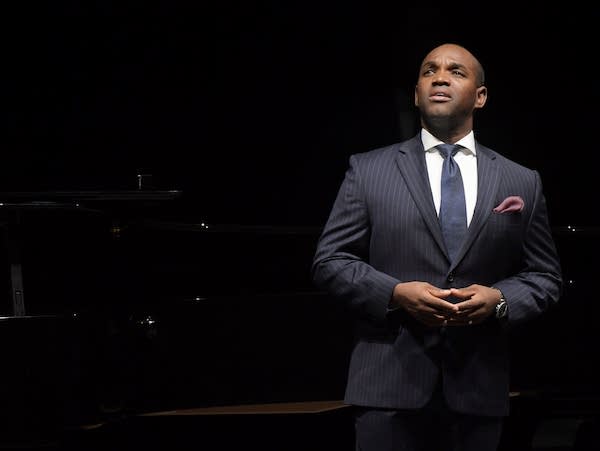Brownlee soars in Vocal Arts recital of Schumann and Sorey

Lawrence Brownlee performed a recital, presented by Vocal Arts DC, Thursday night at the Kennedy Center.
Tenor Lawrence Brownlee’s name rarely appears in print without the label “bel canto” affixed to it, but you might not have known it from his performance for Vocal Arts DC Thursday at the Kennedy Center’s Terrace Theater. Until the encore — a gorgeous account of the simple children’s song “Angels Watching Over Me” that had Brownlee floating effortlessly in the vocal stratosphere — there was more drama than bel canto on offer.
The program was one that Brownlee has performed all over the country during the past fourteen months with his formidable accompanist, Myra Huang, on piano: Schumann’s Dichterliebe (A Poet’s Love) on poems by Heinrich Heine; and Cycles of My Being, a powerful new piece written for Brownlee by Tyshawn Sorey on poems by Terrance Hayes, all three African-American artists. It would be hard to find two sets of poetic texts that reflected more divergent states of mind: Heine’s poet, the self-absorbed, self-pitying romantic, not unlike Schumann himself; and Hayes’ searching, sometimes defiant picture of the world as seen through the eyes and mind of an African-American man.
The six poems of Hayes’ cycle are grouped in two sets of three with poems labeled Hope (pt. 1) and Hope (pt. 2) at their centers. Both “Hope” texts are lists of what hope means to a black man in America but the two lists are quite different. In pt.1 hope turns to concrete things and actions: “When walking hope is a swagger”, “When hunted hope is a knife.” Pt. 2’s hope turns inward — “When frustrated hope is calm”, “When betrayed hope is forgiveness” — and this dichotomy epitomizes the dilemma black men face in relating to the world.
Brownlee communicated all this with a compelling mixture of intensity and introspection. He may be known as one of today’s leading bel canto tenors but, at least in this piece, his focus was as much on the text as on pure vocal beauty (of which there was plenty). He spit out consonants. He pushed up on the highest notes where the text needed that kind of urgency and he projected despair with a sense of steely endurance. Sorey, who wrote this cycle for Brownlee, finally let the tenor’s bel canto soul loose in the last song, “Each Day I Rise, I Know,” an ecstatic, extended cantillation-like expression of optimism and courage that Brownlee nailed with light flexibility and amazing breath control.
The Schumann cycle that opened the program was very much a shared venture with Brownlee and Huang taking equal but different roles, Brownlee focusing on the drama and angst while Huang attended to the soul. This was a robust performance. After a delicately hesitant piano introduction Brownlee the poet entered the scene with a vigorous “Im wunderschönen Monat Mai” (In the wondrously beautiful month of May), filled with awe, and followed this up two songs later with a spitfire paean to flowers, nature and love punctuated with emphatic consonants. In “Ich grolle nicht” (I bear no grudge) Brownlee proclaimed his forgiveness (and the poet’s ambivalence) with shouts and, in “Hör’ ich das Liedchen klingen” (I hear the little song playing), his jealousy and bitterness spoke eloquently though an intense pianissimo.
All the while, underneath the poet’s emotional turmoil, Huang provided nuanced and beautifully inflected lines. Schumann reserved some of the most intense moments of this cycle for the piano postludes that end many of the songs and Huang handled these with a quiet that conveyed both balance and resignation to the poet’s decidedly unquiet mind.
Vocal Arts DC presents counter tenor Iestyn Davis with lutenist Thomas Dunford on May 14 for its season finale. vocalarts.org
